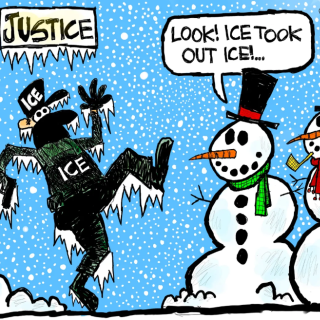Occupation and Resistance – the birth of one heralds the inevitable creation of the other. The existence of the first is the life blood which sustains the second, and the death of one signals the demise of the other. This symbiotic relationship between the two is innate and uncompromising.
This law of nature is written in stone. Humankind has known this self-evident truth from the beginning of time. It is also not new that man has forever failed to learn from his own experiences. What is ironic though is man”s ability to vacillate between the two, the Machiavellian capacity to adore or abhor as circumstances and self-interest dictate, regardless of universal moral and ethical values.
What we see unfolding before our eyes at present, is what the world calls a genocide and Israel and its supporters call “a war of self-defense.” In the context of this war of excessive brutality, that term in itself is cynical and a deliberate misnomer. An occupying state”s use of force against an occupied people is, by its very nature, a “war of aggression.” International law decrees that an occupied people have “the right of resistance” against their occupiers, be it military occupation, denial of liberty and equal human rights, or forcible and illegal seizure of land and property.
Israel stands guilty of all three.
I speak from personal experience. My family and I were caught in Pakistan”s brutal Civil War of 1971. As a result, the eastern half of the country broke away from the western half, to emerge as the new state of Bangladesh. Pakistan had come into being as the result of equal effort and great sacrifices made by all its people, together, in both wings. There was no military occupation by the western wing of the country of its eastern wing. And yet – the emerging reality of administrative, economic, and political domination by the western wing, very soon generated multiple grievances and a perception of being considered “less than equal.” This simmering discontent erupted in a full-blown war for separation, and all the might of the Pakistan army could not quell the people”s desire or determination for self-rule. The violence and death toll on both sides was horrendous.
Point to ponder: The people who were called terrorists and insurgents by the Pakistan army, were called Mukti Bahini – “Freedom Fighters” by the people of that land. The Freedom Fighters won.
In 1857, the Indians rose up to expel the British colonial masters from their country. The British called the uprising “The Mutiny” and “The Rebellion,” the Indians called it their “First War of Independence.” An estimated 6000 British were killed, and 800,000 Indians, many of my forefathers among them. Probably even more, as a result of famines and epidemics which followed the war. The Indians finally got their independence in 1947, and the colonial empire was dismantled worldwide soon after.
Point to ponder: The “rulers” were banished and the “rebels” and “mutineers” won their freedom.
The African National Congress was labelled a terrorist group, and Nelson Mandela was dubbed a terrorist by the USA. In 1964, he was sentenced to life in prison. Twenty-seven years later, as the White government of South Africa, as well as the world, understood the futility as well as the absurdity of occupation and apartheid, Mandela emerged from prison in 1990. In 1993 he was awarded the Nobel Peace Prize. In 1994, he was elected the first Black President of his country. He visited the US several times and was received by President Clinton at the White House. He was also extended the honour of addressing the joint session of Congress. Farcical fact: Mandela remained on the US terrorist watch list until 2008! The reason for this absurd delay was given as “bureaucratic oversight.”
Point to ponder: Upon his death in 2013, Mandela was acclaimed worldwide as a hero, and an icon of democracy and social justice: the terrorist had become a “global celebrity.”
J. Edgar Hoover was the first director of FBI and remained at its helm for 47 years. He was a segregationist, believed in white supremacy, and thought the Civil Rights movement was a threat to the American way of life. His dislike for and opposition to Martin Luther King was well known, and under him, the FBI conducted extensive surveillance and harassment of King, in attempts to discredit him. MLK was labelled “the most dangerous negro” by Hoover’s intelligence agency.
In 1968, King was assassinated, but the movement he had ushered in did not die with him. The passionate desire for equality and freedom that he had awakened, the resistance to segregation and discrimination which he had fostered, and the awareness in the larger community of the injustice being perpetrated turned into a groundswell. And in 1965, following Bloody Sunday in Selma, Alabama, President Johnson signed the Civil Rights Act into law. In 1983 Martin Luther King Day was established, declared a national holiday and signed into law by President Reagan. Today on his day, his legacy is honoured through rallies, marches and laudatory speeches all around the country.
Point to ponder: The “most dangerous negro” is now hailed as a national hero and a worldwide role model for civic activism.
Ireland was the first country to be colonized by the English, and it was also the first to throw off that yoke. The English conquered Ireland in the 12th century, then populaled it through “settler colonialism.” They secured and maintained their hold over the conquered population through brutal force, scorched earth tactics, humiliation and intimidation. They outlawed the Irish language and suppressed their practices and culture. But no amount of cruelty and repression could snuff out the Irish identity or the Irish passion for freedom. Their centuries old resistance bore fruit and in 1922 the independent Irish Free State came into being.
Point to ponder: National, religious and cultural identity is deeply embedded in the DNA of a people and cannot be obliterated. Even after centuries, it rises triumphantly to defeat occupation.
Worth noting: The Irish Republican Army, still waging a political as well as an armed struggle for the unification of their country which has been split into half along sectarian lines by the British, has been dubbed a “terrorist” organization!
Is there any wonder then that the most ardent supporters of Palestine over decades have been the South Africans and the Irish?
As of today, the Gaza death toll stands at more than 35,000 of which almost 60 percent are women and children, more than 80,000 are injured and more than 10,000 are missing. A population of two million is displaced once again, more than 80 percent of all civic structure has been destroyed, and starvation and disease stalk the ruined streets. The Naqba – the catastrophe – of the Palestinian people has been ongoing for 76 years, and continues.
So called world “leaders” may forget, but history knows to repeat itself and its lessons: Occupation will end, Palestine will be free.
In the words of Nelson Mandela: “We know thar our freedom is incomplete without the freedom of Palestinians.”



